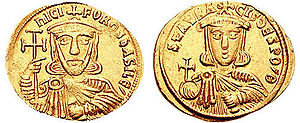Staurakios

Staurakios or Stauracius (Greek: Σταυράκιος), (died January 11, 812) was Byzantine emperor from July 26 to October 2, 811.
The son of Emperor Nikephoros I, Staurakios had been crowned as co-emperor by his father in 803. The chronicler Theophanes the Confessor claims that Staurakios was guilty of rape, a claim perhaps colored by his hostility to Nikephoros I. In 807 Staurakios married the Athenian Theophano, a relative of the deposed Empress Irene.
Staurakios participated in his father's expedition against Krum of Bulgaria in 811, and barely escaped with his life from the disastrous Battle of Pliska, in which his father was killed. However, Staurakios was paralyzed by a sword wound near his neck, and was saved by the imperial guard which retreated from the battlefield. Because of his uncertain condition he was hastily crowned at Adrianople, the first time an emperor of the Eastern Empire had been crowned outside Constantinople.
Due to his debilitating wound, Staurakios was unable to exercise actual authority. As his condition worsened, the court was split between the factions of his wife Theophano and his sister Prokopia, who hoped that her husband Michael Rangabe would be chosen as the emperor's heir. As it became clear that Staurakios intended to designate Theophano as his successor (or else to abolish the empire and declare a republic), the supporters of Michael forced the emperor to abdicate on October 2, 811. Staurakios retired to a monastery where he died from the effects of his wound on January 11, 812. Michael Rangabe became emperor, as Michael I.
External links
![]() Media related to Stauracius at Wikimedia Commons
Media related to Stauracius at Wikimedia Commons
References
- The Oxford Dictionary of Byzantium, Oxford University Press, 1991.
- This article incorporates text from a publication now in the public domain: Chisholm, Hugh, ed. (1911). Encyclopædia Britannica (11th ed.). Cambridge University Press.
{{cite encyclopedia}}: Missing or empty|title=(help)
